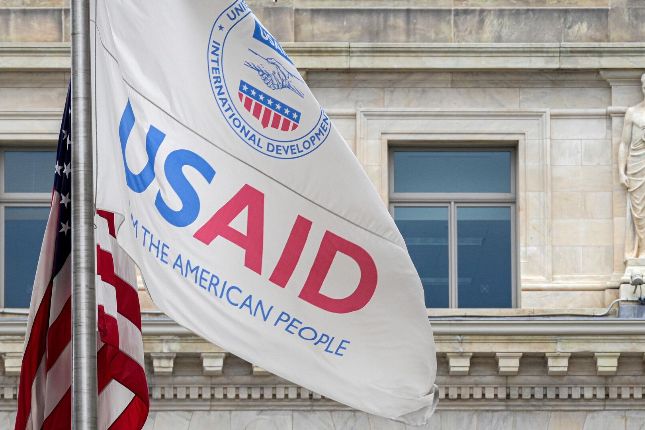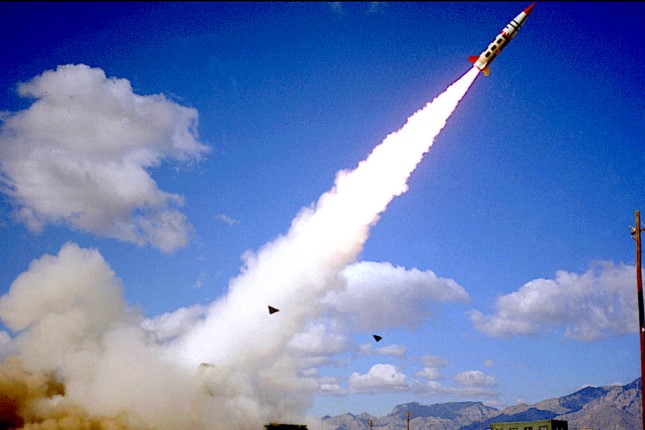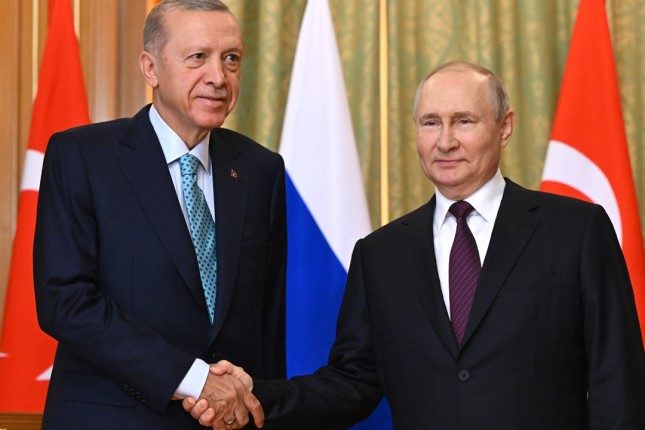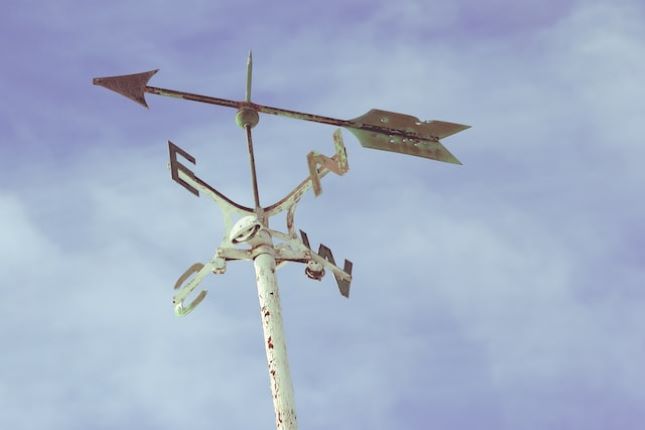The scenes of Gaza’s genocide will shape generations to come, and Joe Biden has ensured that current and future generations will blame the U.S. for this war as much as they will blame Israel. The U.S. government openly admits helping the Israeli government in executing its genocidal war.
The U.S. will continue in its unconditional support for Israeli genocide, and the Biden administration has been a full partner while frequently feigning concern for the “humanitarian situation” in Gaza, as if Palestinians are dying from a devastating plague.
Arab political anger is building up, and the scenes of the destruction of Gaza will spawn new militant organizations and political parties. Cries for revenge are heard in all Arab demonstrations, and someone will seize the moment and likely express rage at U.S. interests.
State Department officials are sharing those concerns in internal memos, but Biden and Blinken are focused on the need to resume Saudi-Israeli normalization talks. Gaza will certainly remain in Western news long after this war of genocide is ended.
It is too early to predict the exact consequences and the repercussions of American support for what is being called the second Nakbah. What Arabs are watching on their TV screens is quite different from the little that is filtered through U.S. TV news and the mainstream media.
Biden Persists Despite No Popular Support
Evidently Americans have seen enough, however. A new Gallup poll reveals that a majority of Americans disapprove of the Israeli war in Gaza, even though Gallup’s phrasing of the question characterized genocide as a mere “Israeli military action,” bestowing a moral legitimacy on one of the worst war crimes in decades.
The poll also shows that the majority of Democrats and Independents are turning against Israel in the conflict in the Middle East; only staunch Republican support for Israel (often presented in biblical, millenarian terms) saves Israel from total collapse in U.S. public standing.
Yet, Biden and the Democratic Party leadership continue to offer full support for Israel regardless of deceptive leaks (about Biden-Netanyahu rifts) that are intended to assuage Arab and Muslim public opinion in the U.S. and in the Middle East.
Unlike the Past

The U.S. has suffered through various crises in its relationship with the Arab and Muslim worlds over the decades. America has been at war (with much of the developing world) since the end of WWII and has often deployed troops, changed governments, toppled elected leaders, imposed despots, and incited disturbances and seditions in various parts of the region.
The Nakbah did not immediately affect U.S. standing in the region because the U.S. was not perceived to be the major player in a region historically dominated and colonized by European powers. But rising anger against the British role in the creation of Israel had severe consequences, and by 1956 (with the tripartite invasion of Egypt on behalf of French-British economic interests and Israeli political aims), Britain was unceremoniously expelled from the Middle East.
Antipathy against Britain was so prevalent that British correspondents had to distance themselves from the policies of their government before they could enter into conversation with people on the street. The U.S. took over the region officially after Suez in 1956. The U.S. proved to be a qualified successor to racist European colonizers.
Washington became quite adamant that it would not pay a price for its wars and policies in the region, however. The rising role of the AIPAC (and its research arm the Washington Institute for Near East Policy (WINEP) was predicated on the assumption that no matter how closely the U.S. aligns itself with Israeli occupation and aggression, it would never lose economic and political power in the region.
The U.S. enjoys several strategic advantages there: the Libyan and Iraqi states and societies were largely decimated by U.S. wars and military intervention, while Syria was destroyed and fragmented thanks to U.S. and Gulf intervention.
But the Arab League since at least 2003, has come under the direct control of U.S. State Department officials. A U.S. official now dutifully attends sessions of the Arab League. Qatar, and then Saudi Arabia, alternated in controlling the Arab League agenda on behalf of the U.S. government.
Yet today’s developments in the region (with the war in Gaza and Lebanon) can’t be compared to the past.
This calamity is destined to shape generations, and it is certain that thousands of Palestinians — and other Arabs — will be planning violent acts of revenge.
To be sure, the region is dominated by governments that are friendly to the U.S. but even they are having difficulty controlling their angry populations. How far will Arab governments go in shielding U.S. and Israeli interests from their angry people?
Regional Protests
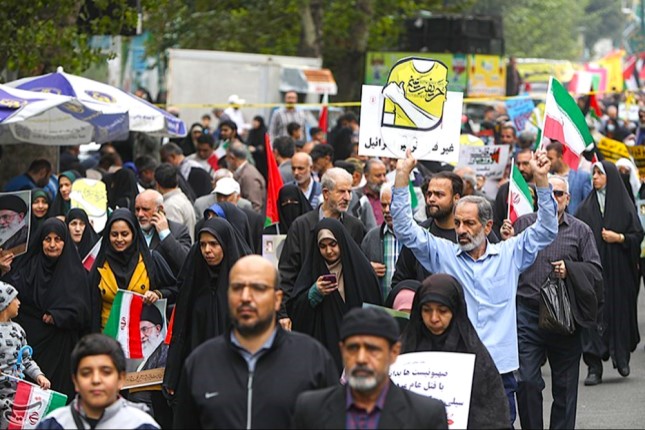
Gaza protest in Teheran in October. Photo: TasnimNews / Amin Ahouei/Wikimedia Commons.
Public reactions in the Arab world have not been properly covered in the Western press. It’s true that massive demonstrations for Palestine have been larger in many Western countries than in some Arab countries. But massive protests are held weekly in Yemen (in various cities), and Iran, Pakistan and Turkey have also had several massive protests.
Lebanon has been fully engaged in the war against Israel since Oct. 7, and Hizbullah — while clearly avoiding a larger war — is consistently proving that “resistance fronts are fully united.”
Armed groups in Iraq have also shown support, while other countries have to contend with repressive regimes in planning public expressions of anger; even in the West Bank, the C.I.A.-sponsored security forces act just like all other Arab regimes in quelling manifestations of public solidarity with the resistance in Gaza, Lebanon and Yemen.
The standing of Yemen in the Arab world has risen sharply due to the daring military stance of the ruling Ansar Al-Allah (“Houthi”) government despite U.S. and British raids inside the improvised country. The Houthis will no longer be portrayed (as has been the habit of Saudi, UAE and Qatari media) as mere tools of Iran.
The Houthis are now in the forefront of Arab nationalist assertion of identity through solidarity with Gaza. Hizbullah, on the other hand, still faces high expectations from those in the region who want the Lebanese group to open an all-out war against Israel.
So-called Abraham Accords on Ice

President Joe Biden and Saudi Crown Prince Mohammed bin Salman bin Abdulaziz bump fists at Al-Salam Palace in Jeddah, on July 15. Photo: Saudi Press Agency / Wikimedia Commons / CC BY 4.0.
Even the friendliest Arab regimes to the U.S. have had to react by suspending the Abraham Accords. In the Trump and Biden administrations, the lynchpin (or the only element) of U.S. policy toward the Arab-Israeli conflict has been the encouragement and promotion of normalization between pro-U.S. depots and Israel.
Putting it on hold, at least for a time, the Saudi regime has contradicted U.S. accounts of its intentions toward normalization, perhaps being aware of Saudi public opposition to a relationship with Israel.
The U.S. will continue to push, but the price of Saudi acceptance will be higher (in terms of security arrangements, import of advanced U.S. arms and military technology and even a nuclear reactor inside the kingdom). The Saudi regime will also extract bigger concessions from Israel; previously, the Saudi de-facto ruler, Mohamed bin Salman, spoke only of “easing the life of Palestinians”.
Containing the Rage
Arab public anger will likely not be reflected uniformly across the region. Public dissatisfaction with the Egyptian ruler over economic hardships has increased due to his regime’s cooperation with Israel in the siege and strangulation of Gaza.
In Jordan, the government was forced to take a tougher public stance against the Israeli war to absorb public outrage over Gaza (two thirds of the population of Jordan are originally Palestinian refugees). The protests outside the Israeli embassy in Amman have been getting fiercer in recent days.
Even Morocco, which the U.S. and Israel have treated as a loyal client of Mossad, witnessed many demonstrations geared toward rejection of normalization. In Tunisia and other countries rulers must reiterate their opposition to normalization despite Gulf (UAE-Saudi) promotion of the theme in their media.
It took several years of planning after the Nakbah, for the first signs of repercussions to be registered. George Habash and his comrades at the American University of Beirut began plotting revenge soon after their expulsion from their homeland. The Movement of Arab Nationalists which Habash founded in the early 1950s, adopted “revenge” as one of its mottos.
Main photo: Gazans outside Indonesian Hospital in Jabalia, north of the Gaza Strip, on October 9, 2023, following Israeli airstrikes © Palestinian News & Information Agency. or Wafa, in contract with APAimages / Wikimedia Commons / CC BY-SA 3.0.
Source: Consortium News.





















